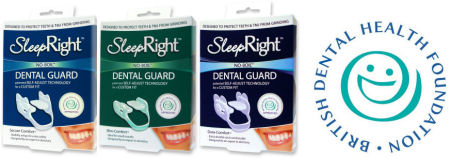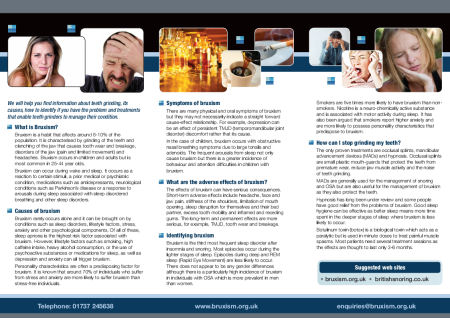Why bruxism occurs is not always clear. In the dental profession the belief that bruxism and dental occlusion are causally related has been widespread. However there is little evidence to support this belief.
Recent research concluded that neither occlusal interference nor factors related to the oral facial skeleton have a role in the aetiology of bruxism. Recent studies suggest that sleep bruxism is secondary to sleep related arousals (defined by a rise in autonomic cardiac and respiratory activity that tends to be repeated 8-14 times per hour of sleep). The rhythmic muscle activity that occurs in sleep bruxism peaks in the minutes before rapid eye movement sleep. This suggests that there is some mechanism related to sleep stage transitions that influence the motor neurons of bruxism.
It is known that bruxism rarely occurs alone. Research has consistently found that bruxism is found more frequently in those individuals who have an existing sleep disorder such as snoring, breathing pauses during sleep and Obstructive Sleep Apnoea (OSA). Other parasomnias such as sleep talking, violent or injurious behaviours during sleep, sleep paralysis, hypnagogic/hypnopompic hallucinations (semi-consciousness between sleep and wake) are also more frequently reported by bruxists and tooth grinding individuals. Of these, OSA appears to be the highest risk factor as it is associated with an arousal response. The termination of the apnoea event is often accompanied by a variety of mouth phenomena such as snoring, gasps, mumbling and tooth grinding.
Demographic and lifestyle factors such as young age, higher educational status, smoking, caffeine intake and heavy alcohol consumption are associated co-factors of bruxism. The use of psychoactive substances (tobacco, alcohol, caffeine, or medications for sleep, depression, and anxiety) increases arousal and leads to problems falling asleep, staying asleep and daytime sleepiness. Bruxism is significantly higher in individuals whose lifestyle includes the use of these psychoactive substances.
Mental disorders, anxiety, stress and adverse psychosocial factors are significantly related to tooth grinding during sleep and it has been found that nearly 70% of bruxism occurs as a result of stress or anxiety. It is well documented that job related stress is detrimental to good sleep and as a consequence can be responsible for daytime sleepiness. But, it is also the most significant factor associated with bruxism. One study found that shift workers who suffered stress due to dissatisfaction with their shift-work schedule were more susceptible to bruxism than those who were satisfied and not stressed. Interestingly, the men in this study demonstrated high levels of job stress, depressive symptoms and bruxism whereas none of these symptoms were significant for the women. These adverse symptoms were particularly evident in male workers who experienced low social support from supervisors or colleagues.
Many physical ailments have psychological components that may influence a person's vulnerability to illness as well as their ability to recover. Stress levels and personality characteristics are often considered as initiating, predisposing and perpetuating factors for several diseases. The workplace offers a unique environment where stress and personality play a major role in performance. Personality variables include the individual's coping style both in perception and coping techniques. Some people are less resilient to stress and therefore suffer more from the physical and psychological consequences. Previous research findings point to the possibility of a link between bruxism and the work environment, especially the coping strategies for work related stressful demands. Some people of course, may be exposed to high levels of stress unrelated to their job, but still affect bruxism.
Would you like to receive our most current information and offers by e-mail? Enter your e-mail address here to sign up.

The SleepRight dental guards are the only occlusal splints approved by the British Dental Health Foundation. Find out more.

If you would like us to provide your surgery with our information leaflets, please complete the on-line request form.
Do you need more information for your article or you want to organise an interview? Contact our media desk.

Introducing the world's leading oral appliance for bruxism, snoring and sleep apnoea. Read more.